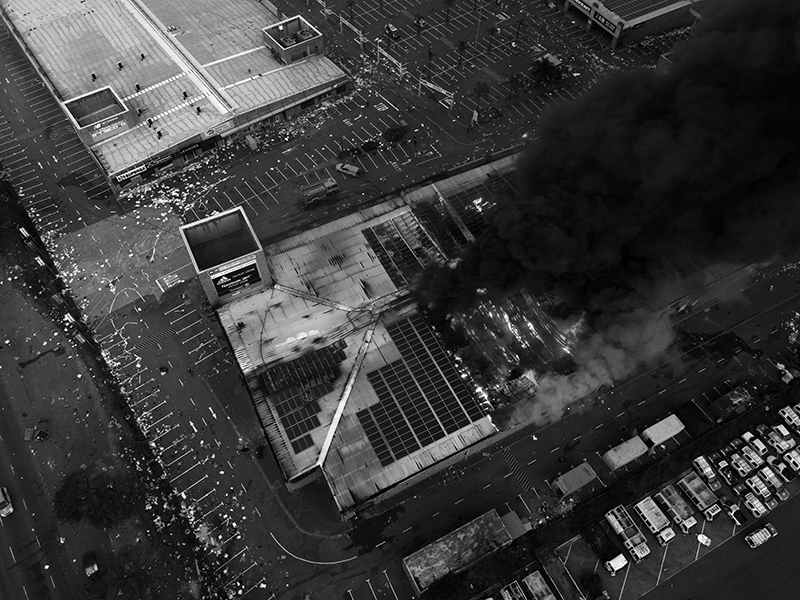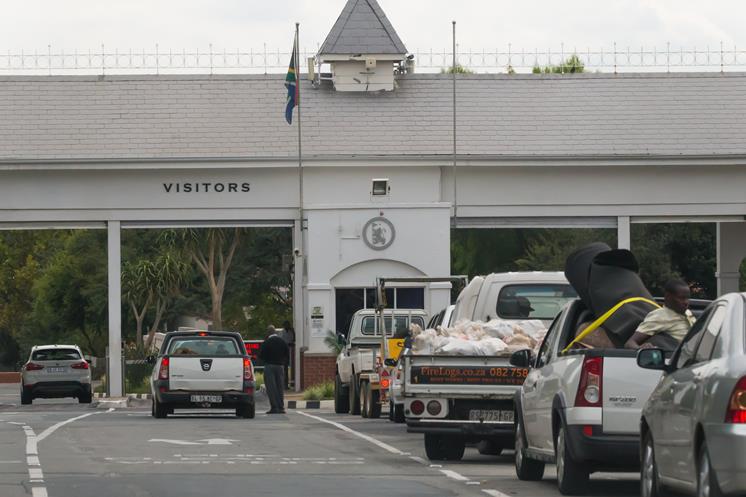Leonard Pillay’s 9mm pistol hasn’t left his side since July 9 of last year. “Okay, that’s a bit of an exaggeration,” the middle-aged mechanic admitted in an interview. “I haven’t got it on me when I sleep. But I promise you, it’s never far away. Never.”
Pillay lives in a small house in Phoenix, a northern suburb of Durban, a city on South Africa’s eastern coast. On the morning of Thursday, July 8, he and his two daughters were listening to a local radio station over breakfast when the announcer reported that former President Jacob Zuma would start serving a 15-month prison sentence that evening in a prison about 100 miles north of the city.
“I said to them, ‘Here comes shit.’ But I didn’t expect things to get as bad as they did!”
Zuma was incarcerated for defying a court order to testify at a commission of inquiry into a multibillion-dollar corruption scandal that occurred while he was in office, between 2009 and 2018. His imprisonment lasted only a few weeks before he was set free on medical parole, but the incarceration ignited the country’s worst civil unrest since the end of apartheid, in 1994. Demand for private security services and gated community properties is rising sharply in the wake of the July riots.
The riots, instigated by political figures close to Zuma, rampaged through several cities, looting and burning warehouses and malls. For three days, police were unable or unwilling to stop the mayhem. Protection of lives and property fell largely to private security guards and members of citizen militias … including Pillay.
“For 48 hours we kept the scumbags out of Phoenix,” he said. “In that time the only sign of the cops was a helicopter that flew over now and again. But, when some of my friends up the road shot a few people who attacked their houses, the cops came fast … to accuse them of murder!”
The police confiscated the firearms of those who had used the weapons in self defense and, Pillay said, interrogated the alleged shooters about why they had not called the “proper authorities” before “taking the law into their own hands.”
“We told them, ‘We did call you, but no one answered the phone at the police station,’” Pillay said.

The rioting and looting left almost 350 people dead, with thousands injured, arrested and jailed.
This kind of widespread violence and conflagration had been predicted almost 30 years ago, at the end of apartheid and during the violent buildup before the beginning of multiracial polling. Pillay and millions of his fellow citizens of South Africa are now beginning to think that their fears about widespread racial violence in the country have not been avoided but merely delayed.
Image: Aerial view of a burning shopping center in Durban, South Africa, on July 12, 2021, after a weekend of widespread looting and rioting. (Big Red Design Agency / Shutterstock)
“People started calling us the ‘Rainbow Nation’ and the ‘miracle nation’ after the peaceful election in 1994,” said Pillay’s wife, Candice. “But look around us! There’s just poverty and crime. This nation is at war with itself!”
After Nelson Mandela became leader of the African National Congress (ANC) and South Africa’s first black president, one of his first executive actions was to set in motion the unraveling of the country’s police force, which, although it had been enforcing apartheid for decades, was also a remarkably effective crime-fighting machine.
Successive ANC administrations purged the police of experienced generals, detectives, and investigators who had served during apartheid. These officers were replaced in the new South African Police Service (SAPS) with former members of the armed wings of black liberation movements, such as the ANC’s uMkhonto weSizwe (Spear of the Nation).
While these guerillas-made-peace-officers were good at dismantling, reassembling, and discharging AK-47s as well as detonating land mines and homemade bombs, they had no idea how to combat urban crime.
The inability of the SAPS to counter violent crime was soon evident in the surging murder, rape, grievous assault, and armed robbery rates. Today, South Africa is one of the most dangerous places on earth, outside of war zones, according to international crime-monitoring groups.
Armormax, a maker of bulletproof cars and armored vehicles, rates South Africa the third most dangerous country in the world, behind only Venezuela and Papua New Guinea. Every year, South Africa makes the United Nations Office on Drugs and Crime’s top-ten list of countries with the most murders. South Africa’s government reports that almost 60 people are murdered every day in South Africa; independent groups say that number is significantly higher.
South Africa also has the dubious distinction of being the “rape capital of the world.” The South African Medical Research Council estimates that one in four South African women will be raped during her lifetime.
Private security officers now outnumber police officers in South Africa by two-to-one. Terrified South Africans who can’t trust the police pay an estimated $6 billion a year to try to prevent becoming the next victim.
As crime has burgeoned, so have gated communities. These are luxury townhouse developments and retirement villages within enclosed suburbs wrapped in cordons of steel electric fencing. Gates block access to public roads, and armed security guards man a limited number of access points. Visitors usually must sign in to gain entrance, and the guards may record vehicle details as well as IDs, phone numbers, and fingerprints.
Prof. Karina Landman, a town planner with the Faculty of Engineering, Built Environment, & IT at the University of Pretoria, is South Africa’s foremost authority on these “enclosed living spaces.” The rise of gated communities was initially triggered by the “radical political transition” of 1994, she said.
“We saw that as crime skyrocketed, it was a time of instability; people didn’t know what the future would hold,” she said in an interview. “Suddenly we saw more and more estates. It’s also when people first started to close off their suburbs.”
In 2019, according to analysis by one of the country’s biggest financial institutions, First National Bank, almost 60 percent of all new residential properties constructed in South Africa were apartments and townhouses with private security. This is more than double the percentage in 2015 and more than quadruple the percentage in 2000, according to the bank.
Andrew Amoils, head analyst at New World Wealth, a Johannesburg-based market research firm, said that not even the 2008 global financial crisis and South Africa’s deepening economic malaise have slowed the demand for gated living.
According to the firm’s last quantitative analysis of gated communities in Gauteng province, which includes the country’s wealthiest and most crime ridden city, Johannesburg, there were 26,573 estates and security villages in 2001. By 2016, this data point had more than tripled, jumping to 92,696. And these statistics don’t include the thousands of secured townhouse complexes that now stretch more than 40 miles from Johannesburg toward Pretoria.
After the July 2021 riots, there appears to be a renewed spike in demand for gated properties, according to Amoils. “We’ve been a pioneer of gated community living for almost three decades now,” he said. “There’s only one country in the world with more of these estates than South Africa, and that’s the United States.”
Johnny Pereira, factory owner and 52-year-old husband and father of two daughters, said he decided to buy a home in a gated community in the eastern outskirts of Johannesburg after watching the chaos unfold on TV. “I told my wife, ‘We don’t have the money to emigrate, but we have the money to live as safely as we possibly can in this place.’ So we sold everything and made the move.”
Within Pereira’s new community, peacocks stroll on manicured lawns, and fruit trees grow beside a lake with multicolored paddleboats resting on a rocky shoreline. Outside the 12-meter-high metal gates and electric fencing, there’s a different world. The neighboring suburb has seen better days; scores of African migrants pack into homes rented out by slumlords. Many of the houses have broken windows and paint peeling from their walls. “The [weekend] noise sometimes carries on ’til Sunday night; it’s the only bad thing about living here,” Pereira sighs. “Police sirens; nonstop. Gunshots….”
The Tshwane city council is considering a developer’s application to build what would be one of the country’s largest gated communities, holding 2,000 homes and 5,500 residents in Centurion, a metro suburb of Pretoria.
Janet Booysen, 45 years old, said in an interview that she plans to move into the new project if it is built. Booysen said she’s concerned about a wave of brutal and sometimes fatal attacks on elderly people in Centurion. For Booysen, a self confessed “white, privileged, middle-class” woman who said she’s “never been hungry a day” in her life, gated communities are an attempt, however futile, at regaining a lifestyle she feels has “disappeared” in democratic South Africa.
“Yes, apartheid was evil,” Booysen said in a soft voice. “So it’s great that everyone can vote and we can marry whoever we like. But we live in fear. Reality is, we can’t walk the streets in safety; our children can’t play in the parks. So are we really free?”
For Booysen and many South Africans, a new segregation has succeeded apartheid. Lawbreakers of every stripe have now become the overlords, jailers, and violators of the citizenry.

Leave a Reply